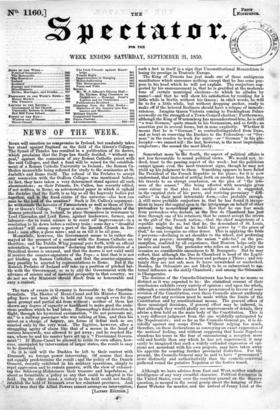Somewhat more to South, the aspect of political affairs is
not less favourable to sound political views. We would not, in- deed, trust to the passing aspect of the week ; but the politician cannot ignore even the most transient signs, though he may not yield up his judgment to them. Something appears to have failed the President of the French Republic in his plans ; for it is now understood, that instead of setting forth on another tour, he brings his travels to an abrupt conclusion on the plea of "the late- ness of the season." His being conclusion, with neuralgia gives some colour to that plea; but another obstacle is suggested, in the emptied state of his purse, and reviving pecuniary "diffi- culties" in their most intractable form,—also probable enough. A still more probbble conjecture is, that he has found it inexpe- dient to leave the-capital open to the intriguings on behalf of other pretenders to monarchical power. Not that he can fear much from pretenders who declare, as the Duo de Chambord has just done through one of his retainers, that he cannot accept the crown as the gift of the French nation,—that the chief magistrate of a republic might do so, but that he, the descendant of St. Louis, amulet; implying that as he holds his power by "the grace of God," he can recognize no other donor. This is applying the fable perverso--deolining,to set shoulder to the wheel, and preferring to rely on prayer; inverting the axiom " aide-toi' " on the pre- sumption, confuted by all experience, that Heaven helps only the passive and inert. The pretender who relies on such a policy can occasion no considerable uneasiness to M. Bonaparte. But he may reflect, that although the Duo de Chambord is head of the Legiti- mists, the party includes a Berryer and perhaps a Thiers ; and-cer- tainly they are not safe men to leave unwatehed or unchecked. Besides the Orleanists are not likely to be so subservient to ma- ternal influence as the sickly Chambord; and among the Orleanists is Chaugarnier. The decision of the Conseils-Generaux has been by no means so distinct as it was expected to be : the statistical resume of their conclusions exhibits every variety of opinion ; and upon the whole, although a considerable number have pronounced in favour of some revision of the Constitution, even those Councils almost uniformly suggest that any revision must be made within the limits of the Constitution and by constitutional means. The general effect of these municipal decisions, if general effect may be inferred, is, that although they would gladly see improvements of details, they advise a firm hold on the main body of the Constitution. This is a very different judgment from the one wishfully anticipated by the Napoleonists ; and so far as the Councils-General go, it is de- cidedly-against any coups d'etat. Without relying too much, therefore, on these declarations as conveying an exact expression of the national feeling, and without supposing that Lows Napoleon
abandons his tours in the fear of encountering a reception more cold and hostile than any which he has yet experienced, it may easily be imagined that such a widely extended expression of opi- nions not accordant with his own projects, may have taken away his appetite for courting further provincial festivities. For the present, the Councils-General may be said to have " pronounced " more "distinctly and authoritatively than the councils-convivial gathered round the putative Napoleon at the festive board. .


























